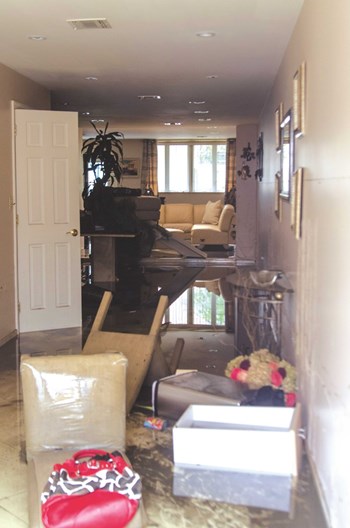
Seeing the positive in life is a wonderful thing, but when you’re a manager at an association, regardless of its size or how civil and well-mannered shareholders and owners can be, there will always be situations that arise that need to be handled. Problems come in all shapes and sizes and it’s usually up to the manager to rally the board, association staff, and other professionals to solve them. Because let’s face it, if someone isn’t there playing quarterback to get everyone on the same play, it could lead to disaster.
These problems can be anything from hellacious maintenance crises to eccentric or bizarre behavior among residents to a troublesome financial situation that needs to be dealt with. Here are three great examples of good management in action that led to triumphs for everyone involved.
No Parking
Albert Pellegrino, CMCA, AMS, ARM, president of P&A Management. Inc. in Hamilton, New Jersey, says he has experienced a myriad of problems in his years in the business, and is always pleased when a solution can be derived to fix whatever problem occurs. Among his great successes include dealing with two major fires and helping a board to resolve a big dispute before it required legal action.
Recently, Pellegrino dealt with a situation at a Hamilton community his company took over where he was able to work closely with the board to get its finances back on-track and save the entire community from possible financial ruin.
When P&A took over, it quickly discovered that a great deal of those in the community were delinquent with payments and needed to come up with a plan to get things back on track. Pellegrino spoke with the board about ideas and came up with a plan that he hoped would get the money coming back in.
“The community is in an area where parking is considered a big thing, so we decided to not allow those with delinquent accounts to park,” Pellegrino says. “Parking is a luxury and if they weren’t going to pay, we weren’t going to let them take advantage of that.”
While this may have seemed like a veiled threat, thanks to help from the board and staff workers, license plate numbers were written down on weekends and people reported in when cars were parked that shouldn’t have been, and several cars were towed away for breaking the rule.
“You can send a letter threatening to put a lien on the unit or taking them to court, but most people ignore those and know it takes a long time for anything to happen,” Pellegrino says. “When you start taking away something that they need and count on—like parking—it makes people start to take action quickly. People found the money.”
Within two months of implementing this plan, all 19 delinquent accounts were put on payment plans or completely paid off, and the problem was solved. Pellegrino was very pleased that the plan had worked so well and will consider it again if another of his properties ever faces a similar financial crisis.
“It was important because the community was having some big landscaping issues that needed to be taken care of, but the money wasn’t there,” he says. “Once everything was back to normal, things could be taken care of the way they needed to.”
Fire and Ice
Access Property Management (which has offices in Flemington and Edison, New Jersey) is celebrating its 25th anniversary this year and its first-ever client, Hunter’s Crossing condo association in Three Bridges, has had the recent misfortune of having to deal with two significant fires and some water pipe freezing issues.
“Through all this, our on-site manager, Barbara Scholz, has demonstrated her professionalism and expertise under some rather difficult circumstances and has worked well with the board of trustees at Hunter’s earning their respect,” says Scott Dalley, APM’s senior vice president and chief operating officer. “Any success by our team is considered a great success to everyone in the company.”
An industry vet, Scholz first came aboard to manage Hunter’s Crossing in March of 2011 and knew what it meant for a manager to take initiative and ensure all the bases are covered for success when a difficult circumstance comes up. Upon taking the position, she was cleaning up the insurance issues of a fire that had happened a month before and then lightning struck again—literally this time—when a second fire resulted from lightning actually hitting the building.
“The key to success is communication and making sure everyone is on the same page,” she says. “Communicating with the homeowners, the board members and the community. You need to let everyone know where the responsibility of the association falls, hiring the right contractors and engineers (making sure they can handle the magnitude of the job) and balancing the insurance claims.”
It’s also vital to keep everyone updated as the process goes along to stop people from worrying and let them know everything is getting better. Many of the homeowners were displaced because of the fire, but thanks to the efforts of Access, Scholz, the board and the community’s staff, people returned to their homes.
The most recent problem came as a result of January’s polar vortex when several homeowners at Hunter’s Crossing didn’t think enough to keep their heat up and saw their pipes freeze. Some of these were the result of bank-owned units, but others were just homeowners who weren’t proactive enough to take precautions.
“The news was telling people to drip their faucets, open up your cabinets and we put notices out every winter on ways they should be prepared, but it almost always happens, and this year was one of the worst,” Scholz says. “Then it falls back on the association and we have to pick up the pieces, direct the homeowners so they know their next step, call their insurance company, file a claim with the association’s insurance and see what we can help cover. We walk them through the process so they can help themselves and get their property back to pre-frozen pipe conditions.”
Scholz says that it took nearly a month to help everyone but as of mid-February, all residents seemed satisfied with the outcome and another crisis was avoided.
Before Sandy
In the aftermath of Superstorm Sandy in 2012, a number of New Jersey associations had to deal with some major maintenance issues and thankfully, most quick thinking and savvy managers were able to rise to the challenge. But even before Superstorm Sandy, Hurricane Irene came along and caused damage as well.
Chip Hoever, CMCA, AMS, PCAM, owner of Somerset Management Group, LLC in Somerset, New Jersey, says that getting his residents through the effects of this August 2011 storm was his greatest accomplishment.
“One of our associations in Franklin Township [in New Jersey], which had approximately 300 units, lost power for a long time during Irene,” he says. “Without power, there were lots of problems with flooded basements.”
As soon as the storm started, the phone calls came rolling in. Luckily, Hoever lives only about two miles from the site, so he was able to get there with no problem. Hoever remembers spending nearly 30 hours straight working with residents and his staff during this trying time to alleviate as many problems as possible.
“People were calling constantly, and I had one person on staff who did a great job of answering the phones and dealing with everyone in a calm manner,” he says. “The board president and vice president were out there helping direct people around and we were all working as a team.”
Some of the vending companies even came by—bypassing roadblocks—to do what they could to help get things up and running. Truckloads of sump pumps were delivered, emergency generators were brought in and food and water was available for anyone who needed it.
“It wasn’t just the physical effort of everyone involved that was so great, but there was also a lot of emotional issues, the single mothers home alone with the kids, the older people who were scared…it was neighbor helping neighbor,” Hoever says. “The board put aside some of its traditional rules and thought out of the box and everyone worked together.”
The board decided that everyone could just put their damaged garbage outside and the association would pay for the removal of all items, taking it out of the hands of the individual residents.
“I was very happy to see everyone helping each other, you don’t see a lot of that these days,” Hoever says. “It took a good week to get things back to normal, but it all started with a great effort by everyone involved that first night.”






Leave a Comment